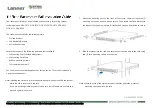
To bypass the ARP inspection, use the following command.
•
Specify an interface as trusted so that ARPs are not validated against the binding table.
INTERFACE mode
arp inspection-trust
Dynamic ARP inspection is supported on Layer 2 and Layer 3.
Source Address Validation
Using the DHCP binding table, Dell Networking OS can perform three types of source address validation (SAV).
Table 25. Three Types of Source Address Validation
Source Address Validation
Description
IP Source Address Validation
Prevents IP spoofing by forwarding only IP packets that have been
validated against the DHCP binding table.
DHCP MAC Source Address Validation
Verifies a DHCP packet’s source hardware address matches the
client hardware address field (CHADDR) in the payload.
IP+MAC Source Address Validation
Verifies that the IP source address and MAC source address are a
legitimate pair.
Enabling IP Source Address Validation
IP source address validation (SAV) prevents IP spoofing by forwarding only IP packets that have been validated against the DHCP binding
table.
A spoofed IP packet is one in which the IP source address is strategically chosen to disguise the attacker. For example, using ARP spoofing,
an attacker can assume a legitimate client’s identity and receive traffic addressed to it. Then the attacker can spoof the client’s IP address
to interact with other clients.
The DHCP binding table associates addresses the DHCP servers assign with the port or the port channel interface on which the requesting
client is attached and the VLAN the client belongs to. When you enable IP source address validation on a port, the system verifies that the
source IP address is one that is associated with the incoming port and optionally that the client belongs to the permissible VLAN. If an
attacker is impostering as a legitimate client, the source address appears on the wrong ingress port and the system drops the packet. If the
IP address is fake, the address is not on the list of permissible addresses for the port and the packet is dropped. Similarly, if the IP address
does not belong to the permissible VLAN, the packet is dropped.
To enable IP source address validation, use the following command.
NOTE:
If you enable IP source guard using the
ip dhcp source-address-validation
command and if there are more
entries in the current DHCP snooping binding table than the available CAM space, SAV may not be applied to all entries. To
ensure that SAV is applied correctly to all entries, enable the
ip dhcp source-address-validation
command before
adding entries to the binding table.
•
Enable IP source address validation.
INTERFACE mode
ip dhcp source-address-validation
•
Enable IP source address validation with VLAN option.
INTERFACE mode
ip dhcp source-address-validation vlan
vlan-id
312
Dynamic Host Configuration Protocol (DHCP)
Summary of Contents for S4048T-ON
Page 1: ...Dell Configuration Guide for the S4048 ON System 9 11 2 1 ...
Page 148: ...Figure 10 BFD Three Way Handshake State Changes 148 Bidirectional Forwarding Detection BFD ...
Page 251: ...Dell Control Plane Policing CoPP 251 ...
Page 363: ... RPM Synchronization GARP VLAN Registration Protocol GVRP 363 ...
Page 511: ...Figure 64 Inspecting the LAG Configuration Link Aggregation Control Protocol LACP 511 ...
Page 558: ...Figure 84 Configuring Interfaces for MSDP 558 Multicast Source Discovery Protocol MSDP ...
Page 559: ...Figure 85 Configuring OSPF and BGP for MSDP Multicast Source Discovery Protocol MSDP 559 ...
Page 564: ...Figure 88 MSDP Default Peer Scenario 2 564 Multicast Source Discovery Protocol MSDP ...
Page 565: ...Figure 89 MSDP Default Peer Scenario 3 Multicast Source Discovery Protocol MSDP 565 ...
Page 841: ...Figure 115 Single and Double Tag TPID Match Service Provider Bridging 841 ...
Page 842: ...Figure 116 Single and Double Tag First byte TPID Match 842 Service Provider Bridging ...
















































